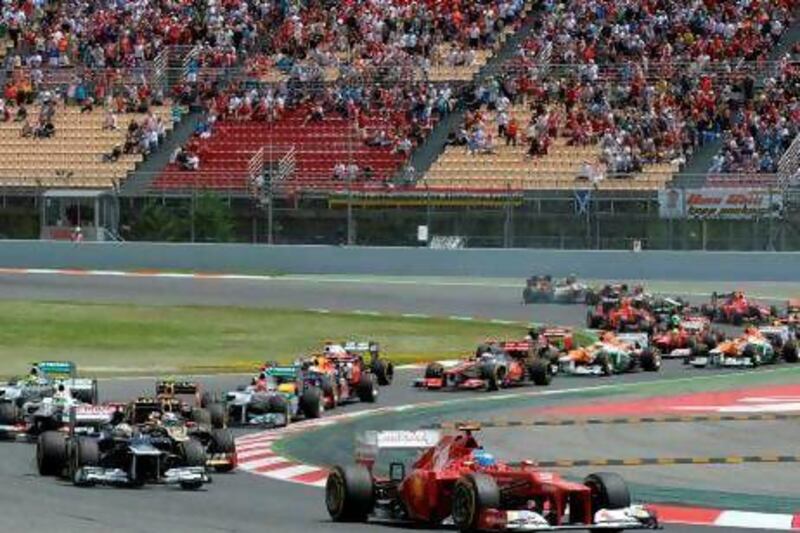On Saturday night at Circuit de Catalunya in Montmelo, glass flutes filled with golden bubbles were handed out at a surprise party to mark the 70th birthday of Sir Frank Williams, the venerated racing team owner.
Simultaneously, 20 kilometres south, in Barcelona, a protest involving somewhere between 45,000 and 220,000 activists was being held in the bustling Plaza de Catalunya square to highlight indignation at the country's spiralling economic crisis.
The Spanish government confirmed earlier this year that the country has slipped into recession as unemployment rates rose to 24.4 per cent for the general workforce and more than 50 per cent for those under age 25.
It is little wonder the country is set to lose one of its two highly expensive grands prix.
The director-general at Circuit de Catalunya spoke of "disaster" as he awaited final race-day attendance figures. "Here for things to go well, we have to have 120,000 people, and if it's under 100,000 it's a disaster," Salvador Servia told Reuters after Saturday's qualifying session.
Five years ago, the attendance at the 2007 Spanish Grand Prix was 140,000, a figure that Servia concedes was so high he felt "uncomfortable". But last year it dropped to almost half that, at 78,000.
The official attendance on Sunday this year was announced as 81,600.
Formula One often appears to operate in a financial bubble, but when friends of drivers struggle to afford tickets to a race - such as was the case last week with HRT's Spaniard Pedro de la Rosa - it is clear a better gauge of the public mood needs to be explored.
The lowest price for a ticket to last weekend's race dropped by €20, but still cost €120 (Dh564) which is outside the budget of many Spaniards.
"It is not only this race that is expensive, but in all countries," said Luis Perez-Sala, the Spanish team principal at HRT, Formula One's only Spanish marque. "F1 is an expensive sport and it is something we need to think about more."
Servia, a former rally driver and politician, said his marketing team had deliberately promoted the race outside of Spain in an attempt to boost attendances. "Europe is very big and we realised that here we would not sell so many tickets, so we decided to market the race on the continent," he said.
Brendan Hayes, an English race fan attending his first Spanish Grand Prix, said "this is a difficult time for everybody" and "more could have been done" by promoters to reduce the ticket prices. He added that the decision to drop one of Spain's two venues in favour of another race in Asia or America was ill-advised.
"For the European fans, we are happy to pay for the travel, but there is a limit to what we can spend nowadays," he said as he browsed merchandise at the Red Bull Racing stall. "To have to go to America, a place where they might soon have more than one race in a country that doesn't really support Formula One, is atrocious - especially when you have places like Germany and Spain maybe losing races. It's wrong because the heart of F1 is in Europe."
Perez-Sala acknowledges the important to HRT of having two home races each year. While he denies the decision to alternate Barcelona with Valencia, host of next month's European Grand Prix, will affect his team financially, he accepts that it will not exactly help his cash-strapped marque as they continue to seek sponsors.
"As a Spanish team, Barcelona and Valencia are our two most important races in the championship," he said. "We have a lot of supporters here and a lot of sponsors as well, but if [alternating venues] is something that financially makes sense, then so be it.
"For us, of course, it is better if we have two home races, but we are not the decision-makers.
"It wouldn't affect us financially, but it would obviously be better to have two places to invite people and show off the team. The most important thing for me is that Spain retains one race."
Servia opposes the idea of hosting a Spanish race at Circuit de Catalunya biennially, arguing that while Valencia is a temporary street-circuit, he has a permanent facility with many full-time staff.
"We are living in hard times with the economy and everything, but we work here the whole year and have started selling tickets for 2013," he said.
"I don't like the alternating idea with Valencia because commercially we have a contract until 2016 and everything is ready and planned. As an organiser, this is a problem for us. If they do it every other year, what do I do with my people and this commercial programme that we have?"
On the streets of Barcelona's La Ramblas de Catalunya, Julio Cantero, a Catalan pharmacist, believes the idea to rotate grands prix is the correct decision. "One race each year is enough. One here, then one there, " he said. "To have two seems too much for the current situation we are in."
Follow us
[ @SprtNationalUAE ]





